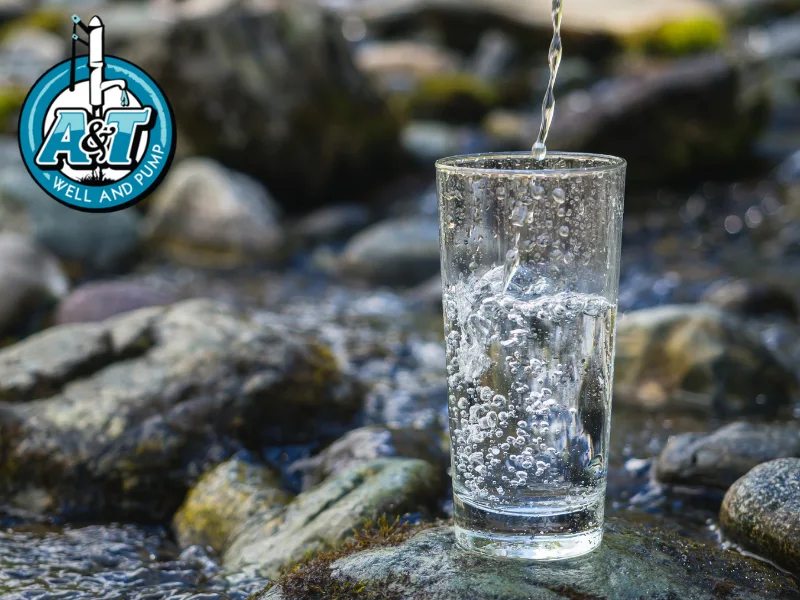An annual well inspection and maintenance helps ensure that your water isn't contaminated and reduces…

If you’ve noticed grit or tiny particles coming from your faucets, you’re not alone. Sand in well water is a fairly common issue for homeowners in Raleigh, NC and the surrounding areas. While small amounts of sediment in well water may seem harmless, ignoring it can lead to costly water well repairs, water quality problems, and potential health risks.
Join the residential well service team from A&T Well and Pump as we cover the common causes of sand in well water, how it can impact your home, and the best solutions to restore clear, clean water.
Table of Contents
Common Causes of Sand in Well Water
Sand or sediment in well water can come from several different sources. Identifying the cause is an important first step to finding the right solution for your home. Below are some of the most common reasons why sand may end up in your home’s water supply.
Natural Erosion
As groundwater flows through soil and rock formations, small particles can naturally erode and make their way into your well. This is especially common in older wells or those located in sandy areas. Over time, the erosion can increase, leading to more noticeable grit in your water.
Poorly Positioned or Missing Well Screen
A well screen acts like a filter, keeping larger particles such as sand out of your water. If the screen is missing, corroded, or improperly installed, it can’t do its job effectively. When this happens, sediment flows directly into your water system.
Over-Pumping
Drawing water too quickly from the well can stir up sand and silt from the bottom. This often happens in shallow wells or when well pumps are set at an incorrect depth. Consistent over-pumping not only brings sediment into your water but can also strain your pump system.
Well Aging and Deterioration
Just like any structure, wells deteriorate over time. Cracked casings, rusted components, or worn-out parts can allow sediment to leak in. If your water well is decades old, sediment issues may be a sign that repairs or upgrades are needed.
Improper Well Construction
Wells that were not drilled or developed properly can be prone to ongoing sediment problems. A poorly constructed well may not be sealed or screened in the right way, leaving gaps for sand to enter. These issues in the well drilling process often show up soon after installation.
How Sediment in Well Water Affects Your Home and Health
Finding sediment in your water isn’t just an inconvenience—it can cause real damage to your plumbing, appliances, and even your health. Sand in well water can lead to issues with:
- Plumbing and Appliances: Sediment buildup clogs faucets, showerheads, and shortens appliance lifespans.
- Pump and Filter Damage: Sand wears down pumps and filters, leading to frequent breakdowns.
- Reduced Water Pressure: Accumulated grit narrows pipes, causing weak water flow throughout the home.
- Health Concerns: Sediment may carry bacteria or contaminants, making water unsafe without testing.

Diagnosing Sand in Your Well Water System
Because sediment can come from multiple sources, diagnosing the problem accurately is key. Homeowners can spot some warning signs, but a professional well inspection often provides the clearest answers.
Visual Signs
Cloudy or gritty water is the most obvious sign of sediment in well water. You may also notice residue at the bottom of glasses or gritty deposits in sinks and tubs.
Sediment Filter Inspection
Checking your sediment filter is a simple way to gauge the problem. If your filter clogs quickly or needs frequent replacement, it usually means sand is entering your system at higher levels than normal.
Professional Well Inspection
A licensed Raleigh water well contractor can examine the casing, pump, and screen to determine where sand is entering the system. They may also test the water to check for bacteria or organic matter. This type of inspection provides detailed insight into both structural and water quality concerns.
Pump and Flow Analysis
Analyzing how your pump cycles and where it sits in the well can help pinpoint sediment issues. If the pump is too close to the bottom, or if flow rates are too high, it may be pulling in sand unnecessarily.
Solutions for Sand and Sediment in Well Water
Once the cause of sand in well water is identified, there are several proven solutions depending on your well’s age, construction, and severity of the problem:

- Sediment Filters and Sand Separators: Filters trap grit before it enters plumbing, while sand separators handle heavier sediment loads.
- Pump Adjustments: Raising or lowering the pump prevents sand from being pulled in during operation.
- Adding or Replacing a Well Screen: A properly installed or updated well screen blocks sand and silt from entering the water supply.
- Well Rehabilitation: Hydrofracturing or cleaning restores flow and reduces sediment buildup in older wells.
- New Well Installation: Replacing an aging or poorly built well ensures long-term protection from sediment issues.
Sand and Sediment in Well Water FAQs
Is sand in well water dangerous to drink?
While sand itself isn’t harmful, it can carry bacteria and other contaminants. Drinking sediment-filled water is not recommended without testing.
Can sediment filters remove all grit?
Sediment filters remove most sand and silt, but they may not capture everything in severe cases. Pairing a filter with a sand separator is often more effective.
How much sand is normal in a well?
A trace amount of fine silt might appear occasionally, but consistent or noticeable grit is not normal. Persistent sand signals a problem that should be addressed.
What’s the difference between silt and sand in water?
Silt is very fine and makes water appear cloudy, while sand is coarser and feels gritty. Both can cause plumbing and water quality issues if left untreated.
Diagnose and Repair Water Well Issues in Raleigh
Sediment in well water can be frustrating, but it’s a problem with proven solutions. At A&T Well and Pump, we help Raleigh-area homeowners identify the cause and implement long-term fixes—whether it's installing a well water filtration system, installing an entirely new well, or another solution.
Contact us today to schedule a well inspection or water test by calling (919) 980-0981 or filling out our contact form below to get started.
Contact Form
We would love to hear from you! Please fill out this form and we will get back to you shortly.
"*" indicates required fields

